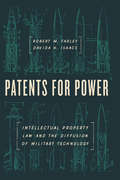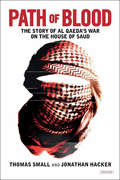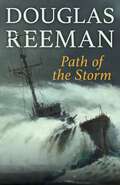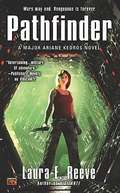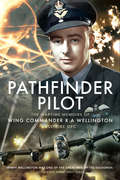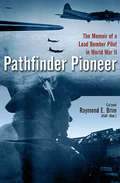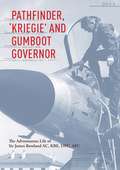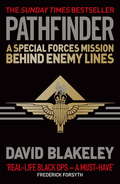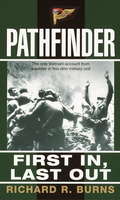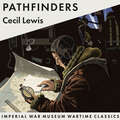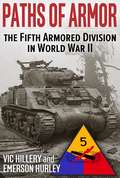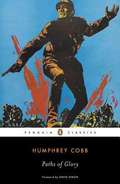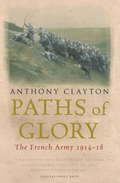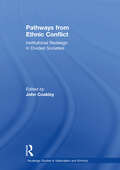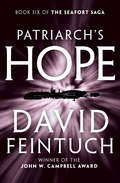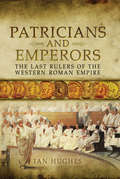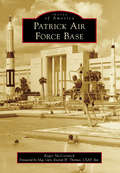- Table View
- List View
Patents for Power: Intellectual Property Law and the Diffusion of Military Technology
by Robert M. Farley Davida H. IsaacsIn an era when knowledge can travel with astonishing speed, the need for analysis of intellectual property (IP) law—and its focus on patents, trade secrets, trademarks, and issues of copyright—has never been greater. But as Robert M. Farley and Davida H. Isaacs stress in Patents for Power, we have long overlooked critical ties between IP law and one area of worldwide concern: military technology. This deft blend of case studies, theoretical analyses, and policy advice reveals the fundamental role of IP law in shaping how states create and transmit defense equipment and weaponry. The book probes two major issues: the effect of IP law on innovation itself and the effect of IP law on the international diffusion, or sharing, of technology. Discussing a range of inventions, from the AK-47 rifle to the B-29 Superfortress bomber to the MQ-1 Predator drone, the authors show how IP systems (or their lack) have impacted domestic and international relations across a number of countries, including the United States, Russia, China, and South Korea. The study finds, among other results, that while the open nature of the IP system may encourage industrial espionage like cyberwarfare, increased state uptake of IP law is helping to establish international standards for IP protection. This clear-eyed approach to law and national security is thus essential for anyone interested in history, political science, and legal studies.
Path of Blood: The Story Of Al Qaeda's War On The House Of Saud
by Thomas Small Jonathan HackerFrom the makers of the documentary of the same name, the history of Al Qaeda’s secret war against Saudi Arabia Path of Blood tells the gripping and horrifying true story of the underground army which Osama Bin Laden created in order to attack his number one target: his home country, Saudi Arabia. His aim was to conquer the land of the Two Holy Mosques, the land from where Islam had first originated, and, from there, to reestablish an Islamic Empire that could take on the West and win. Thomas Small and Jonathan Hacker use new insider evidence to expose the real story behind the Al Qaeda. Far from the image of single-minded holy warriors they present to the world, the bands of soldiers are riven by infighting and lack of discipline. Drawing on unprecedented access to Saudi government archives, interviews with top intelligence officials both in the Middle East and in the West, as well as with captured Al Qaeda militants, and access to exclusive captured video footage from Al Qaeda cells, Path of Blood tells the full story of the terrorist campaign and the desperate and determined attempt by Saudi Arabia’s internal security services to put a stop to it.
Path of the Storm
by Douglas ReemanHong Kong, 1960s: The old submarine-chaser USS Hibiscus, refitting in a Hong Kong dockyard before being handed over to the Nationalist Chinese, is suddenly ordered to the desolate island group of Payenhau. For Captain Mark Gunnar, who is driven by the memory of his torture at the hands of Viet Cong guerillas, the new command is a chance to even the score against a ruthless, unrelenting enemy. But Payenhau is very different from his expectations, and as the weather worsens, a crisis develops that Gunnar must face alone.
Pathfinder (Major Ariane Kedros #3)
by Laura E. ReeveWars may end. But vengeance is forever. Reserve Major Ariane Kedros needs a shot at redemption-and the mysterious aliens known as the Minoans need an extraordinary human pilot with a rejuv-stimulated metabolism like Ariane for a dangerous expedition to a distant solar system. But there's a catch. The Minoans have to implant their technology in Ariane's body, and it might not be removable. Ariane is willing, but as she begins the perilous journey, there is an old enemy hiding within the exploration team who is determined to see them fail. . . .
Pathfinder Pilot: The Wartime Memoirs of Wing Commander R A Wellington DSO OBE DFC
by R. A. WellingtonA riveting account of surviving sixty RAF bombing missions during World War II.During the Second World War, 55,573 RAF Bomber Command aircrew were killed, a shocking 44.4% death rate. A further 8,500 were wounded, and 9,800 became prisoners of war.The author of this thrilling memoir defied the odds, becoming one of the few Lancaster captains to survive his quota of sixty bombing missions. ‘Wimpy’ Wellington’s skills must have been exceptional. After serving in 106 Squadron under the legendary Guy Gibson, he and his crew moved to the elite 83 Pathfinder Squadron, where they coped with the prolonged strain of constant mortal danger, nighttime sorties to distant targets such as Milan, and the steady loss of comrades. Every night they danced with death, surviving enemy fighters, intense flak, and mechanical problems.On completion of flying duties Wellington was sent to the USA and South America to bolster support for the Allied cause. In this vivid account, the decorated and highly accomplished airman tells his story.
Pathfinder Pioneer: The Memoir of a Lead Bomber Pilot in World War II
by Raymond E. BrimOne young man&’s story of combat in the air, constant battles for survival, and the development of radar technology for use against the Luftwaffe. This is the story of how an eighteen-year-old miner shoveling ore from deep in the ground in Utah suddenly found himself, only two years later, 30,000 feet in the air over Nazi Germany, piloting a Flying Fortress in the first wave of America&’s air counteroffensive in Europe. Like thousands of other young Americans, Ray Brim was plucked out by the US Army to be a combat flyer, and was quickly pitted against the hardened veterans of the Luftwaffe. Brim turned out to have a natural knack for flying, however, and was assigned to the select squadron developing lead pathfinder techniques, while experimenting with radar. He was among the first to test the teeth of the Luftwaffe&’s defenses, and once those techniques had been honed, thousands of other bomber crews would follow into the maelstrom—from which 80,000 never returned. This book gives us vivid insights into the genesis of the American air campaign, told with the humor, attention to detail, and humility that captures the heart and soul of our &“Greatest Generation.&” Brim was one of the first Pathfinder pilots to fly both day and night missions, leading bomb groups of six-hundred-plus bombers to their targets. At the onset of his missions in the spring of 1943, B-17 crews were given a fifty-fifty chance of returning. All his raids were nerve-wracking forays into the unknown, struggles to survive the damage to his plane caused by flak and German fighter attacks and bring his ten-man crew home, often wounded—but still alive.
Pathfinder and the President: John C. Frémont, Abraham Lincoln, and the Battle for Emancipation
by John BicknellTwo towering figures of American history collide in this riveting account of how the struggle between Lincoln and his defiant general John C. Frémont shaped the Civil War and emancipation. "... a masterwork of history. . .Bicknell deftly interweaves Frémont's story with the grander narrative of the war and Abraham Lincoln's presidency." -Jon D. Schaff, author of Abraham Lincoln's Statesmanship and the Limits of Liberal Democracy. In 1856, John C. Frémont—the famed "Pathfinder" of the American West—became the Republican Party's first presidential nominee on an anti-slavery platform. Five years later, now a Union general under President Lincoln, he sparked a national crisis by unilaterally declaring emancipation in Missouri. Drawing from extensive research, author John Bicknell masterfully chronicles the volatile relationship between these two leaders as they grappled with slavery, military strategy, and the future of the nation. Reveals how Frémont's radical actions in Missouri influenced Lincoln's own path to the Emancipation Proclamation Explores the complex political and military dimensions of Civil War leadership Illuminates the crucial role of border states in shaping Union strategy Provides fresh insights into the personal dynamics that affected wartime decision-making From award-winning historian John Bicknell comes an essential new perspective on the Civil War era, acclaimed by scholars as "powerful," "engaging," and "distinctive." Perfect for readers of both Civil War history and political biography, this compelling narrative shows how the clash between Lincoln and Frémont helped determine the course of emancipation and the outcome of the war itself. "Bicknell's flair for tightly rendered historical storytelling sits atop a foundation of sweeping research in this powerful tale. . .A colorful and distinctive narrative." -Robert W. Merry, author of Decade of Disunion
Pathfinder, 'Kriegie' and Gumboot Governor: The Adventurous Life of Sir James Rowland AC, KBE, DFC, AFC
by Sir James Rowland Dr Peter YuleA descendant of early pioneers of New South Wales, James Rowland combined a thirst for adventure with a strong sense of duty. Aged just 22, he became a Lancaster pilot in the elite Pathfinder force, flying 34 missions over occupied Europe and being awarded the Distinguished Flying Cross. In January 1945, he was the only survivor of a collision with a Canadian aircraft over Germany. After narrowly escaping being shot as a spy, he spent the rest of the war as a POW. Returning to the RAAF in 1947, Rowland was a test pilot during the early years of the supersonic era, and played a leading role in the Mirage procurement. His leadership qualities and technical expertise saw him become head of RAAF engineering in 1972, and, in a controversial appointment, Chief of the Air Staff in 1975, the first and still the only engineer to head the RAAF. In 1981, Rowland was appointed Governor of New South Wales, a position he held with distinction for eight years. A brilliant pilot and aeronautical engineer, who combined a strong commitment to duty with a great sense of fun, Rowland has a well-earned place among the great leaders of the RAAF.
Pathfinder: A Special Forces Mission Behind Enemy Lines
by David BlakeleyNine men. 2,000 enemies. No back-up. No air support. No rescue. No chance...First in - the official motto of one of the British Army's smallest and most secretive units, 16 Air Assault Brigade's Pathfinder Platoon. Unofficially, they are the bastard son of the SAS. And like their counterparts in Hereford, the job of the Pathfinders is to operate unseen and undetected deep behind enemy lines. When British forces deployed to Iraq in 2003, Captain David Blakeley was given command of a reconnaissance mission of such critical importance that it could change the course of the war. It's the story of nine men, operating alone and unsupported, fifty miles ahead of a US Recon Marine advance and head straight into a hornets nest, teeming with thousands of heavily-armed enemy forces. This is the first account of that extraordinary mission - abandoned by coalition command, left with no option but to fight their way out of the enemy's backyard. And it provides a gripping insight into the Pathfinders themselves, a shadowy unit, just forty-five men strong, that plies its trade from the skies. Trained to parachute in to enemy territory far beyond the forward edge of battle - freefalling from high altitude breathing bottled oxygen and employing the latest skydiving technology - the PF are unique.Because of new rules introduced since the publication of Bravo Two Zero, there have been no first-hand accounts of British Special Forces waging modern-day warfare for nearly a decade. And no member of the Pathfinders has ever told their story before. Until now. Pathfinder is the only first-hand account of a UKSF mission to emerge for nearly a generation. And it could be the last.
Pathfinder: A Special Forces Mission Behind Enemy Lines
by David BlakeleyNine men. 2,000 enemies. No back-up. No air support. No rescue. No chance...First in - the official motto of one of the British Army's smallest and most secretive units, 16 Air Assault Brigade's Pathfinder Platoon. Unofficially, they are the bastard son of the SAS. And like their counterparts in Hereford, the job of the Pathfinders is to operate unseen and undetected deep behind enemy lines. When British forces deployed to Iraq in 2003, Captain David Blakeley was given command of a reconnaissance mission of such critical importance that it could change the course of the war. It's the story of nine men, operating alone and unsupported, fifty miles ahead of a US Recon Marine advance and head straight into a hornets nest, teeming with thousands of heavily-armed enemy forces. This is the first account of that extraordinary mission - abandoned by coalition command, left with no option but to fight their way out of the enemy's backyard. And it provides a gripping insight into the Pathfinders themselves, a shadowy unit, just forty-five men strong, that plies its trade from the skies. Trained to parachute in to enemy territory far beyond the forward edge of battle - freefalling from high altitude breathing bottled oxygen and employing the latest skydiving technology - the PF are unique.Because of new rules introduced since the publication of Bravo Two Zero, there have been no first-hand accounts of British Special Forces waging modern-day warfare for nearly a decade. And no member of the Pathfinders has ever told their story before. Until now. Pathfinder is the only first-hand account of a UKSF mission to emerge for nearly a generation. And it could be the last.
Pathfinder: First In, Last Out: A Memoir of Vietnam
by Richard R. BurnsDecember 1967: Richard Burns had just arrived in Vietnam as part of the fourteen-man 101st Pathfinder Detachment. Within just one month, during a holiday called Tet, the Communists would launch the largest single attack of the war--and he would be right in the thick of it. . . .In Vietnam, Richard Burns operated in live-or-die situations, risking his life so that other men could keep theirs. As a Pathfinder--all too often alone in the middle of a hot LZ--he guided in helicopters disembarking troops, directed medevacs to retrieve the wounded, and organized extractions. As well as parachuting into areas and supervising the clearing of landing zones, Pathfinders acted as air-traffic controllers, keeping call signs, frequencies, and aircraft locations in their heads as they orchestrated takeoffs and landings, often under heavy enemy fire.From Bien Hoa to Song Be to the deadly A Shau Valley, Burns recounts the battles that won him the Silver Star, Bronze Star, Purple Heart, and numerous other decorations. This is the first and only book by a Pathfinder in Vietnam . . . or anywhere else.From the Paperback edition.
Pathfinders: Imperial War Museum Wartime Classics
by Cecil LewisA new edition of Cecil Lewis's 1944 aviation classic.'A highly unusual war novel with several confluent narratives; moving, interesting and of great literary value.'LOUIS de BERNIÈRESOver the course of one night in 1942, the crew members of Wellington bomber 'P for Pathfinder' each reflect on the paths of their own lives, as they embark on a fateful mission deep into the heart of Nazi Germany.Cecil Lewis' novel examines the life of every man in turn, rendering a moving account of each as not merely a nameless crew member, but as an individual with a life lived, 'a life precious to some, or one... these men with dreams and hopes and plans of things to come'.This new edition of the 1944 classic includes a new introduction from an Imperial War Museums historian that puts the novel in historical context and shines a light on this vital and sometimes contested aspect of Britain's involvement in World War II.'It's wonderful to see these books given a new lease of life [...] classic novels from the Second World War written by those who were there, experienced the fear, anguish, pain and excitement first-hand and whose writings really do shine an incredibly vivid light onto what it was like to live and fight through that terrible conflict.'JAMES HOLLAND, Historian, author and TV presenter(P)2021 Headline Publishing Group Limited
Pathogens for War
by Donald H. AveryPathogens for War explores how Canada and its allies have attempted to deal with the threat of germ warfare, one of the most fearful weapons of mass destruction, since the Second World War. In addressing this subject, distinguished historian Donald Avery investigates the relationship between bioweapons, poison gas, and nuclear devices, as well as the connection between bioattacks and natural disease pandemics. Avery emphasizes the crucially important activities of Canadian biodefence scientists - beginning with Nobel Laureate Frederick Banting - at both the national level and through cooperative projects within the framework of an elaborate alliance system.Delving into history through a rich collection of declassified documents, Pathogens for War also devotes several chapters to the contemporary challenges of bioterrorism and disease pandemics from both national and international perspectives. As such, readers will not only learn about Canada's secret involvement with biological warfare, but will also gain new insights into current debates about the peril of bioweapons - one of today's greatest threats to world peace.
Paths of Armor: The Fifth Armored Division in World War II
by Vic HilleryPaths of Armor, first published in 1950, is the account of the historic 5th Armored Division from the time of its formation in October 1941, until the end of the World War II in May 1945. Included in this kindle edition are more than 100 pages of photographs and maps. Because of the secrecy of its missions and the speed at which it moved, the Division was also known as "Patton's Ghosts" (the division was part of Patton's Third Army), and because of its many successes, as the "Victory Division." Following training in the U.S., the Division transferred to England, and landed on Utah Beach in Normandy on July 24, 1944. Then followed months of combat as the Division moved across northern France, Belgium, Luxembourg, and into Germany. In December 1944, the Division took part in the fierce fighting in the Hurtgen Forest and the Battle of the Bulge.
Paths of Dissent: Soldiers Speak Out Against America's Misguided Wars
by Andrew Bacevich and Daniel A. SjursenAmerican veterans who fought in Iraq and Afghanistan offer invaluable firsthand perspectives on what made America’s post-9/11 wars so costly and disastrous. Twenty years of America’s Global War on Terror produced little tangible success while exacting enormous harm. In Iraq and Afghanistan, the United States sustained tens of thousands of casualties, expended trillions of dollars, and inflicted massive suffering on the very populations that we sought to “liberate.” Now the inclination to forget it all and move on is palpable. But there is much to be learned from the immense debacle. And those who served and fought in these wars are best positioned to teach us. Paths of Dissent collects fifteen original essays from American veterans of Iraq and Afghanistan—hailing from a wide range of services, ranks, and walks of life—who have come out in opposition to these conflicts. Selected for their candor and eloquence by fellow veterans Andrew Bacevich and Daniel Sjursen, these soldiers vividly describe both their motivations for serving and the disillusionment that made them speak out against the system. Their testimony is crucial for understanding just how the world’s self-proclaimed greatest military power went so badly astray.Contributors: Gil Barndollar • Dan Berschinski • Joy Damiani • Daniel L. Davis • Jason Dempsey • Erik Edstrom • Vincent Emanuele • Gian Gentile • Matthew P. Hoh • Jonathan W. Hutto, Sr. • Buddhika Jayamaha • Roy Scranton • Kevin Tillman • Elliott Woods • Paul Yingling
Paths of Glory
by Humphrey CobbThe anti-war masterpiece that became an iconic motion picture-now with a foreword by the creator of the acclaimed HBO(tm) series The Wire Familiar to many as the Stanley Kubrick film starring Kirk Douglas, Paths of Glory explores the perilous complications involved in what nations demand of their soldiers in wartime. Humphrey Cobb's protagonists are Frenchmen during the First World War whose nightmare in the trenches takes a new and terrible turn when they are ordered to assault a German position deemed all but invulnerable. When the attack fails, an inquiry into allegations of cowardice indicts a small handful of lower-ranked scapegoats whose trial exposes the farce of ordering ordinary men to risk their lives in an impossible cause. A chilling portrait of injustice, this novel offers insight into the tragedies of war in any age. .
Paths of Glory: The French Army, 1914-18
by Anthony ClaytonAnthony Clayton is an acknowledged expert on the French military, and his book is a major contribution to the study and understanding of the First World War. He reveals why and how the French army fought as it did. He profiles its senior commanders - Joffre, Petain, Nivelle and Foch - and analyses its major campaigns both on the Western Front and in the Near East and Africa. PATHS OF GLORY also considers in detail the officers, how they kept their trenches and how men from very different areas of France fought and died together. He scrutinises the make-up and performance of France's large colonial armies, and investigates the mutinies of 1917. Ultimately, he reveals how the traumatic French experience of the 1914-18 war indelibly shaped a nation.
Paths of Glory: The French Army, 1914-18
by Anthony ClaytonAnthony Clayton is an acknowledged expert on the French military, and his book is a major contribution to the study and understanding of the First World War. He reveals why and how the French army fought as it did. He profiles its senior commanders - Joffre, Petain, Nivelle and Foch - and analyses its major campaigns both on the Western Front and in the Near East and Africa. PATHS OF GLORY also considers in detail the officers, how they kept their trenches and how men from very different areas of France fought and died together. He scrutinises the make-up and performance of France's large colonial armies, and investigates the mutinies of 1917. Ultimately, he reveals how the traumatic French experience of the 1914-18 war indelibly shaped a nation.
Pathway to the Stars: 100 Years of the Royal Canadian Air Force
by Tom Jenkins Michael HoodPathway to the Stars takes readers on a remarkable journey spanning one hundred years of the Royal Canadian Air Force. This beautifully illustrated book shares the rich history of the Royal Canadian Air Force (RCAF) on its 100th anniversary. Produced in partnership with the RCAF Foundation, Pathway to the Stars tells the story of the people, the technologies, and the events that shaped the RCAF from 1924 to 2024. Presenting 100 stories to align with 100 years of the RCAF, the book explores the many ways in which the RCAF contributed to advances in aviation over the past century, from the invention of the G-suit to the development of the first helicopter landing system on a naval ship to the design of the first flight-safety organization for investigating crashes. As we look forward to the next generation of the RCAF, Pathway to the Stars brings to light an inspirational story about Canada and its place in the world over the past century. Proceeds from this book support the ongoing programs of the RCAF Foundation, a Canadian charity that works to celebrate Canada's rich aviation history and future.
Pathways from Ethnic Conflict: Institutional Redesign in Divided Societies (Routledge Studies in Nationalism and Ethnicity)
by John CoakleyThe book begins with an agenda-setting introduction which will provide an overview of the central question being addressed, such as the circumstances associated with the move towards a political settlement, the parameters of this settlement and the factors that have assisted in bringing it about. The remaining contributions will focus on a range of cases selected for their diversity and their capacity to highlight the full gamut of political approaches to conflict resolution. The cases vary in: the intensity of the conflict (from Belgium, where it is potential rather than actual, to Sri Lanka, where it has come to a recent violent conclusion); in the geopolitical relationship between the competing groups (from Cyprus, where they are sharply segregated geographically, to Northern Ireland, where they are intermingled); in the extent to which a stable constitutional accommodation has been reached (ranging from the Basque Country, with a large range of unresolved problems, to South Africa, which has achieved a significant level of institutional stability). This book ranges over the world’s major geopolitical zones, including Asia, the Middle East, Africa and Europe and will be of interest to practitioners in the field of international security.This book was published as a special issue of Nationalism and Ethnic Politics.
Pathways: Star Trek Voyager (Star Trek: Voyager)
by Jeri TaylorIn her acclaimed novel Mosaic, Jeri Taylor, co-creator and former executive producer of the Star Trek: Voyager® television series, explored the previously unrevealed past of Captain Kathryn Janeway, filling in the missing chapters of Janeway's life with a compelling story of bravery, sacrifice, and personal triumph. Now, Pathways traces the winding roads that have led Janeway's fellow officers and closest friends to what may be the greatest crisis of their long journey home. A deadly encounter with hostile aliens has left Captain Janeway's crew separated from the Voyager and slowly starving to death in a disease-ridden alien prison camp. To keep up their determination as they plot their escape, the crew shares with each other the unlikely paths that brought them all to the U.S.S. Voyager and the Delta Quadrant. These are the stories of the command crew of U.S.S. Voyager: of a fair-haired youth who seemed destined for greatness -- or disgrace; of a troubled, half-human woman who didn't seem at home anywhere in the galaxy; of a traveler and treasure-hunter who found the greatest prize of all; of a naive young man who lost his love in pursuit of his dreams; of a Vulcan who formed a surprising bond with a human woman of unusual courage and passion; of a child-woman whose boundless curiosity led to a strange new world of marvels and dangers; and of the man who is perhaps closest of all to Kathryn Janeway, the man whose unspoken love and dedication may hold the key to her survival.... They began as individuals, following very different pathways, but together, under the leadership of one remarkable woman, they have become one of the finest teams in the known universe, the crew of the U.S.S. Voyager.
Patriarch's Hope: Fisherman's Hope, Voices Of Hope, Patriarch's Hope, And Children Of Hope (The Seafort Saga #6)
by David Feintuch&“It&’s full speed ahead with all lasers blazing in this addition (after Voices of Hope) to Feintuch&’s popular space opera series&” (Publishers Weekly). The Transpop Rebellion ended ten years ago with now–Secretary General Nicholas Seafort as a hero. With that political capital, Seafort stepped into place as one of the most powerful men in the world. But political clout isn&’t all it seems to be. While Seafort tries to stay true to his moral code, he&’s being pulled in every direction. His former colleagues in the Navy demand more ships, while the enviro lobbyists plead with him to repair the planet&’s broken ecosystem. Patriarch&’s Hope returns the focus to the Seafort Saga&’s charismatic and troubled title character. An explosive disaster forces Nick to reexamine his life, his family, and his future as adversaries align against him. To save the planet from itself, he will need cunning, allies, and a large helping of luck.
Patricians and Emperors: The Last Rulers of the Western Roman Empire
by Ian HughesPatricians and Emperors offers concise comparative biographies of the individuals who wielded power in the final decades of the Western Roman Empire, from the assassination of Aetius in 454 to the death of Julius Nepos in 480. The book is divided into four parts. The first sets the background to the period, including brief histories of Stilicho (395-408) and Aetius (425-454), explaining the nature of the empire and the reasons for its decline. The second details the lives of Ricimer (455-472) and his great rival Marcellinus (455-468) by focusing on the stories of the numerous emperors that Ricimer raised and deposed. The third deals with the Patricians Gundobad (472-3) and Orestes (475-6), as well as explaining how the barbarian general Odoacer came to power in 476. The final part outlines and analyses the Fall of the West and the rise of barbarian kingdoms in France, Spain and Italy.This is a very welcome book to anyone seeking to make sense of this chaotic, but crucial period.
Patrick Air Force Base (Images of America)
by Major General Thomas USAF Ret. Roger MccormickThe search began in 1946 for a location to conduct long-range missile tests. Cape Canaveral was chosen in part due to a nearby deactivated military base that could support a long-range proving ground for test firing missiles. The base, originally known as Banana River Naval Air Station, was eventually renamed Patrick Air Force Base in honor of a distinguished Army general. Today, Patrick is part of Air Force Space Command, and it is operated by the 45th Space Wing that also oversees launch facilities at nearby Cape Canaveral Air Force Station with the vision of "World's Premier Gateway to Space."
Patrick Blackett: Sailor, Scientist, Socialist
by Peter HoreThis edited volume comprises a series of essays about Patrick Maynard Stewart Blackett, one of the greatest scientists of the 20th century, as well as a prominent figure in the Royal Navy and British politics.
